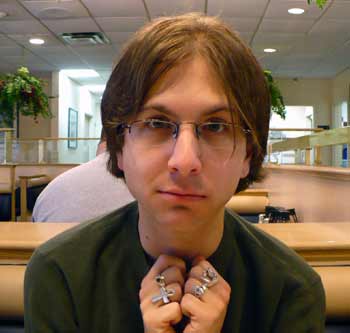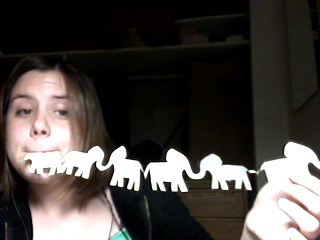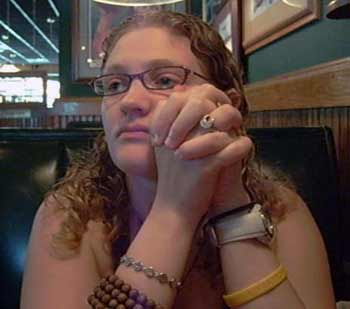
" Slouching Toward Atlantis ««« 2008 »»» I'm a Believer "
10.28.08
11:46 p.m. -Clarissa Pinkola
This kind of forgetting does not erase memory, it lays the emotion surrounding the memory to rest.
On Forgetting

I am listening to an audiobook about a woman who has hyperthymestic syndrome, a condition wherein she has perfect autobiographical recall since she was 14. She considers this more of a disability than a blessing, since she has perfect memory of her life but had no ability to remember what she was asked to learn for school. She has no distance from her memories, they haunt her every waking moment with perfect clarity, consuming her days, blinding her to what is in front of her. She can never forget an offhanded insult someone cast upon her, a moment of depression, a heartbreak, a bad day. Nor can she decide not to think of these, the memories coming unbidden and replaying no matter. Shut your eyes for a moment after reading this paragraph and think of your worse memory. Focus on it, try to relive it. Now imagine that this memory comes back without your trying to remember it while you are driving or kissing your kids goodbye or trying to fall asleep. It cycles through your mind and nothing you will ever do will grant you a moment's reprieve from it. Could you function? Yet, if we are what we remember, don't we become less when something drifts into the mist of forgetting?
Our memories are the seeds on which we justify the formation of our personalities. We are warm or cynical, pacific or violent, all based on prior experiences. But memories are not infallible. That they are allowable as testimony is almost laughable to anyone who has read a little into social psychology. The egocentric bias, for example, overemphasizes our importance in any given event, provoking paranoia or pride where, objectively, we should have neither. Furthermore, the right implication can convince children they've been molested by Satanic cults, so powerful is the desire for memory to conform to our whims. They don't even have to hypnotize the children, as is the constant complaint about alien abduction phenomena, just lead them to assert that these things might have happened. If we are our memories, all it takes is the right whisper at the proper moment to make us someone else entirely. A study was done where subjects were shown pictures of DisneyWorld and then asked questions that referenced Bugs Bunny. All participants reported seeing a character there who simply wasn't, simply because that is what the question asked, so keen is your memory to satisfy others. Worse, we will then grow defensive, arguing for the sanctity of a lie our brain has created. (Damn it, they saw Bugs Bunny and you tricked them with doctored photos!)
In my breakup with Emily, I realized how easy it is to fall into false memories, to have based so much of what you feel on things that may not have been as true as you wished. Friends and family tried to clarify my worldview, giving me multiple - understandably biased - viewpoints which better constituted an objective reality. They told me to forget her and the statement might have been more profound than they realized. I remade not only my present and future when Emily left, but my past as well, aligning it not with the stories I was told but with that which I can verify now. It is frightening how much I remembered of a world she only described to me, how I let myself defend shadows. In returning to a world others remembered, I didn't change (aside from being embarrassed as to my naivety and reprogramming myself to be a bit more skeptical) but I could easily see how I might have had this happened when I was much younger. Now, I am glad to have lost Emily, realizing that I didn't lose the content of seven years but a woman who was not satisfied with what those years contained, trying for tales that she thought could take the place of the truth.
In another example, my love for Melanie is insistent and powerful, but I would have claimed the same thing about Emily a year ago, whether or not it was objectively true. In retrospect, I think the latter assurance would have been made with a weak smile and a half joke of "if she were ever around", but that could just be how I am remembering it now. If we were perpetually revisiting the love we once had, we would be stuck and useless. How could you go on if you effetely exorcised the ghost on your First Real Relationship every day, knew exactly how passionately you felt? It really is better to love and lose than to dwell forever looking at what has gone forever. A certain degree of amnesia is necessary to progress with life, to let our sins and mistakes just become lessons we learned and not marks we try every day to smudge off our permanent records.
It is said that scent is our strongest connection to memory. I no longer remember what Emily smells like. There was the scent of patchouli that she wore on occasion, but I don't remember whether she thought it was too heavy for summer or winter wear and what she smelled like the rest of the time. I have words, not sensations. Likewise, I know I've told people that Kate smelled like Pantene and cigarettes, but that isn't what she smelled like the last time I saw her. It may have been years since that was something that reminded people of her. What I remember drifts from what truly is with each passing day.
Our pain shapes us far more than our pleasure. The hurt I have borne has directed me to who I am. If I lose the sting, I feel that I would lose a bit of the lesson I was to learn. At the same time, if I spent more time focused on the sting than it took to type out a few entries on the subject, I've given it too much of my soul. We try to strengthen the memories that most justify our current place in life, drawing the map backward to see that this was always our path, if just because we never took the other forks and twists.
If I lost Melanie - a concept that gives me a chill - I know that I would keep losing her for years, the taste of her kiss, the scent of her hair, the feel of her head on my chest, her slightly off-pitch singing, the face she makes that causes me to fall into paroxysms of laughter. Some sensations might persist for a decade, but that only means that I would spend that decade keenly aware that a bit more of her slipped from my mind. Forgetting may dull the edge of the pain of losing her, but I would retrace as much of her as I could, perhaps obsessing (if quietly).
I had trouble in my adolescence because I had no way to get the memories out of my head and they plagued me because I didn't want to forget, but being the sole witness to my life was impossible. I needed a little silver bowl where I could keep loose remembrances that would otherwise worm their way into my life and prevent my living in the present. My writing provided me a way of almost immediately externalizing my thought process, so my cognition can focus on bigger and better things (not burning pancakes). Should I ever need to revisit a moment or refresh a time in my life, I only need to look back and - once I am finished being horribly embarrassed as to my prior writing style - it is as if it just happened. All the details twinkle back for a little while from wherever they were resting in my unconscious.

But forgetting can be a boon. I've encountered people who have had hideous things happen to them that they couldn't forget. If I had to vividly recall the pains I've been through, I don't know that I could contrive coping mechanisms enough to survive.
Some people are much better at active forgetting. I think Emily had begun the process of reformatting our life before she walked out of my apartment for the last time, recasting and rephrasing facts to better suit what she told others happened, what she has convinced herself happened. Kate couldn't forget me, partially because we saw one another all the time even after she dumped me, and it plagued us both. I don't think she denied for a moment what happened and what was happening. I think she remembered with clarity and that wore at her. I don't want to forget, even when the events reflect nothing good upon me, because my life happened to me no matter how I presently feel about it. I don't want to lose myself to revisionist history.
As a matter of natural course, you spackle over the painful memories. You repress. I don't remember getting mugged. I remember going into the alley at my then girlfriend Jen's behest. I remember her pulling me out of there as our friend Nick abandoned us to them to save his own skin. What happened in the middle, how the eight boys surrounded me and the tiniest, most cowardly one ordered his friend to punch me? I could only reconstruct that afterward and then it faded from my mind entirely. I remember screaming in the hallway of my high school for anyone to help me afterward, of the security guards being too busy hitting on the sophomore girls to help. I remember sitting in the police station and having them try to victimize me again, assuring me that I was a drug dealer and the deal had just gone bad, that this gang was just good kids and I was the bad guy hurting their fists with my face. It was tough to remember who they were, except for the weasel who ordered me punched, who my mother had taught in grade school. As such, for about a week, I was terrified of any Hispanic guy in that age group since any one of them could have been in the gang - an acquired racism that passed once one of my best friends pointed out that she was Hispanic. Losing the memory of that trauma, while it slowly allowed me to remember what it was to be warm, left me skittish and tense.
For years, in stressful situations, in tough discussions with girlfriends, I would lose myself and the thread of the conversation. In one argument with Kate, as we both were crying, I had to confess that I no longer had the slightest idea why we were mad at one another and just wanted to be kissing her, a request to which she immediately acceded. To this day, I still don't know what that fight was about, who started it and why. I know I found her tearstained face beautiful and I was sincerely repentant if I had hurt her in anyway, though I couldn't begin to imagine why I had. Only later in life, once Emily had dumped me, did Melissa inform me that the sensation is called "dissociating", a concept that is pathological enough that I would take great pains to avoid it. This has shaped my conflict resolution style, since I know that I have to remain calm and collected if I am actually going to be able to remember the outcome of the discussion.
We forget these things because we need to. If I could remember quite how much it hurt to get dumped, I don't know that I wouldn't spend my days licking my wounds. But I've written about these, so they are outside of me. I can tell you the words, but the emotions behind the pain have been laminated and made innocuous with time. We need to prune what we can no longer be, no longer the five-year-old hiding under the piano in kindergarten or the middle schooler with the unfortunate mullet. Technically, those were me, but such an alien creature that I may as well have turned into a chrysalis and butterfly in the interim. And one day, even the twenty-seven-year-old typing these words will be so divorced from who I am that I have forgotten him as well.
Soon in Xenology: Belief.
last watched: Goonies
reading: Krakatoa
listening: Highly Evolved
" Slouching Toward Atlantis ««« 2008 »»» I'm a Believer "
Thomm Quackenbush is an author and teacher in the Hudson Valley. He has published four novels in his Night's Dream series (We Shadows, Danse Macabre, Artificial Gods, and Flies to Wanton Boys). He has sold jewelry in Victorian England, confused children as a mad scientist, filed away more books than anyone has ever read, and tried to inspire the learning disabled and gifted. He is capable of crossing one eye, raising one eyebrow, and once accidentally groped a ghost. When not writing, he can be found biking, hiking the Adirondacks, grazing on snacks at art openings, and keeping a straight face when listening to people tell him they are in touch with 164 species of interstellar beings. He likes when you comment.